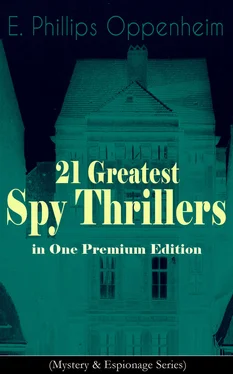The other seemed a little taken aback but remained, apparently, full of the conviction that his overtures could be nothing but acceptable.
“It is well to sleep,” he agreed, “if one has worked hard. Now I myself am a hard worker. My name is Selingman. I manufacture crockery which I sell in England. That is why I speak the English language so wonderful. For the last three nights I have been up reading reports of my English customers, going through their purchases. Now it is finished. I am well posted. I am off to sell crockery in London, in Manchester, in Leeds, in Birmingham. I have what the people want. They will receive me with open arms, some of them even welcome me at their houses. Thus it is that I look forward to my business trip as a holiday.”
“Very pleasant, I’m sure,” Norgate remarked, curling himself up in his corner. “Personally, I can’t see why we can’t make our own crockery. I get tired of seeing German goods in England.”
Herr Selingman was apparently a trifle hurt, but his efforts to make himself agreeable were indomitable.
“If you will,” he said, “I can explain why my crockery sells in England where your own fails. For one thing, then, I am cheaper. There is a system at my works, the like of which is not known in England. From the raw material to the finished article I can produce forty per cent. cheaper than your makers, and, mind you, that is not because I save in wages. It is because of the system in the various departments. I do not like to save in wages,” he went on. “I like to see my people healthy and strong and happy. I like to see them drink beer after work is over, and on feast days and Sundays I like to see them sit in the gardens and listen to the band, and maybe change their beer for a bottle of wine. Industrially, Mr. Englishman, ours is a happy country.”
“Well, I hope you won’t think I am rude,” Norgate observed, “but from the little I have seen of it I call it a beastly country, and if you don’t mind I am going to sleep.”
Herr Selingman sat for several moments with his mouth still open. Then he gave a little grunt. There was not the slightest ill-humour in the ejaculation or in his expression. He was simply pained.
“I am sorry if I have talked too much,” he said. “I forgot that you, perhaps, are tired. You have met with disappointments, maybe. I am sorry. I will read now and not disturb you.”
For an hour or so Norgate tried in vain to sleep. All this time the man opposite turned the pages of his book with the utmost cautiousness, moved on tiptoe once to reach down more papers, and held out his finger to warn the train attendant who came with some harmless question.
“The English gentleman,” Norgate heard him whisper, “is tired. Let him sleep.”
Soon after five o’clock, Norgate gave it up. He rose to his feet, stretched himself, and was welcomed with a pleasant smile from his companion.
“You have had a refreshing nap,” the latter remarked, “and now, is it not so, you go to take a cup of English tea?”
“You are quite right,” Norgate admitted. “Better come with me.”
Herr Selingman smiled a smile of triumph. It was the reward of geniality, this! He was forming a new friendship!
“I come with great pleasure,” he decided, “only while you drink the tea, I drink the coffee or some beer. I will see. I like best the beer,” he explained, turning sidewise to get out of the door, “but it is not the best for my figure. I have a good conscience and a good digestion, and I eat and drink much. But it is good to be happy.”
They made their way down to the restaurant car and seated themselves at a table together.
“You let me do the ordering,” Herr Selingman insisted. “The man here, perhaps, does not speak English. So! You will drink your tea with me, sir. It is a great pleasure to me to entertain an Englishman. I make many friends travelling. I like to make friends. I remember them all, and sometimes we meet again. Kellner , some tea for the gentleman—English tea with what you call bread and butter. So! And for me—” Selingman paused for a moment and drew a deep sigh of resignation—“some coffee.”
“Very kind of you, I’m sure,” Norgate murmured.
Herr Selingman beamed.
“It is a great pleasure,” he said, “but many times I wonder why you Englishmen, so clever, so world-conquering, do not take the trouble to make yourselves with the languages of other nations familiar. It means but a little study. Now you, perhaps, are in business?”
“Not exactly,” Norgate replied grimly. “To tell you the truth, at the present moment I have no occupation.”
“No occupation!”
Herr Selingman paused in the act of conveying a huge portion of rusk to his mouth, and regarded his companion with wonder.
“So!” he repeated. “No occupation! Well, that is what in Germany we know nothing of. Every one must work, or must take up the army as a permanent profession. You are, perhaps, one of those Englishmen of whom one reads, who give up all their time to sport?”
Norgate shook his head.
“As a matter of fact,” he said, “I have worked rather hard during the last five or six years. It is only just recently that I have lost my occupation.”
Herr Selingman’s curiosity was almost childlike in its transparency, but Norgate found himself unable to gratify it. In any case, after his denial of any knowledge of the German language, he could scarcely lay claim to even the most indirect connection with the diplomatic service.
“Ah, well,” Herr Selingman declared, “opportunities will come. You have perhaps lost some post. Well, there are others. I should not, I think, be far away from the truth, sir, if I were to surmise that you had held some sort of an official position?”
“Perhaps,” Norgate assented.
“That is interesting,” Herr Selingman continued. “Now with the English of commerce I talk often, and I know their views of me and my country. But sometimes I have fancied that among your official classes those who are ever so slightly employed in Government service, there is—I do not love the word, but I must use it—a distrust of Germany and her peace-loving propensities.”
“I have met many people,” Norgate admitted, “who do not look upon Germany as a lover of peace.”
“They should come and travel here,” Herr Selingman insisted eagerly. “Look out of the windows. What do you see? Factory chimneys, furnaces everywhere. And further on—what? Well-tilled lands, clean, prosperous villages, a happy, domestic people. I tell you that no man in the world is so fond of his wife and children, his simple life, his simple pleasures, as the German.”
“Very likely,” Norgate assented, “but if you look out of the windows continually you will also see that every station-master on the line wears a military uniform, that every few miles you see barracks. These simple peasants you speak of carry themselves with a different air from ours. I don’t know much about it, but I should call it the effect of their military training. I know nothing about politics. Very likely yours is a nation of peace-loving men. As a casual observer, I should call you more a nation of soldiers.”
“But that,” Herr Selingman explained earnestly, “is for defence only.”
“And your great standing army, your wonderful artillery, your Zeppelins and your navy,” Norgate asked, “are they for defence only?”
“Absolutely and entirely,” Herr Selingman declared, with a new and ponderous gravity. “There is nothing the most warlike German desires more fervently than to keep the peace. We are strong only because we desire peace, peace under which our commerce may grow, and our wealth increase.”
“Well, it seems to me, then,” Norgate observed, “that you’ve gone to a great deal of expense and taken a great deal of trouble for nothing. I don’t know much about these things, as I told you before, but there is no nation in the world who wants to attack Germany.”
Читать дальше












